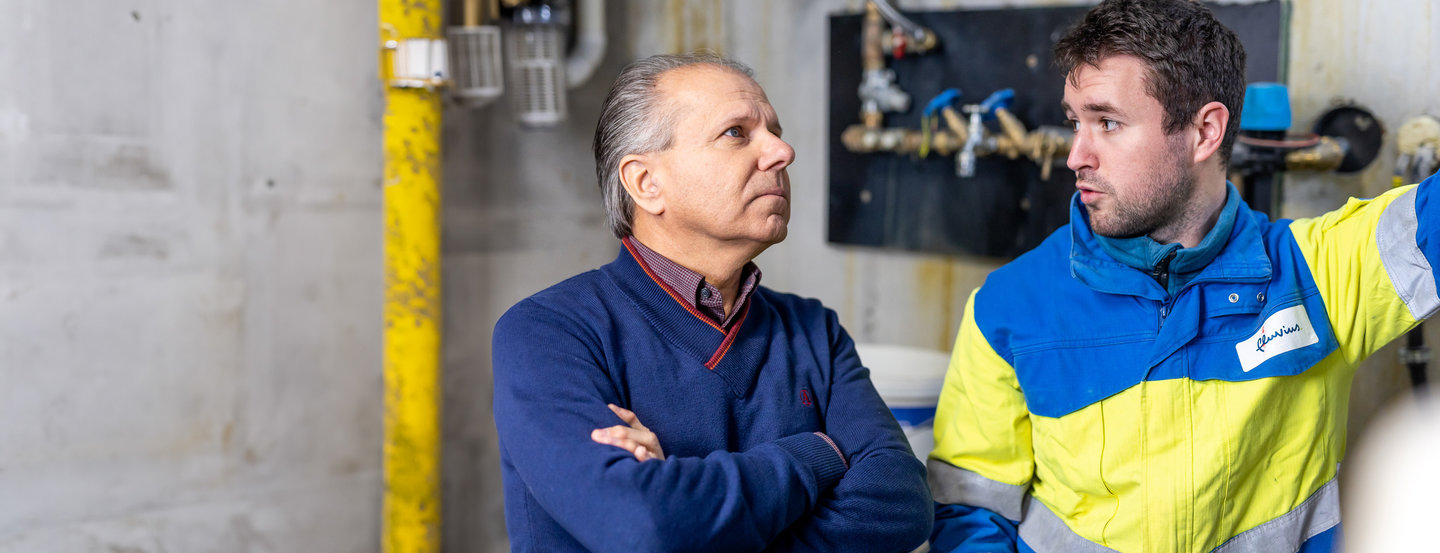
Focus on customers
No matter what job we are doing, at Fluvius we always provide the best possible service. That means: a service that fully lives up to the customer’s needs and expectations. Among other things, this means quick and clear answers, rapid execution with minimal waiting times and disruption, and clear communication. We strive to achieve this for the 6.5 million Flemish residents who put their trust in us, and for our shareholders, all 300 Flemish cities and municipalities.
Putting the customer centre stage is therefore crucial and is also a key pillar in our strategy. Every action we take in this context is an expression of our strategic commitment: 'By the end of 2025, every Fluvius employee will work, act and think customer-centric.' To meet the needs of our customers more effectively, we focus on four service promises.

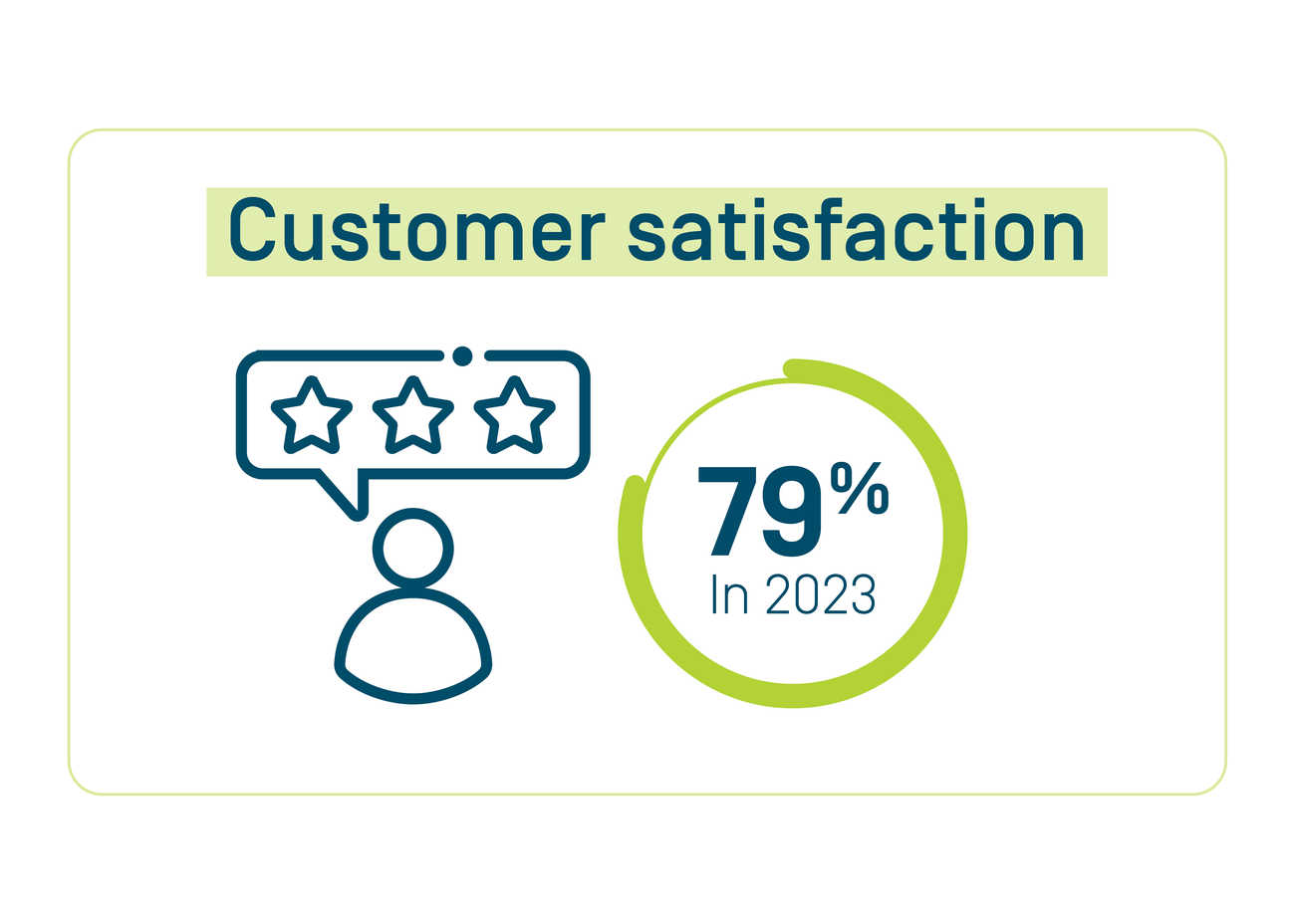
| Service type | 2022 | 2023 |
|---|---|---|
| Meter readings | 94,31% | 91,31% |
| Studies & installation | 75% | 79,77% |
| Connections | 88,50% | 84,69% |
| Available subsidies | 86,21% | 83,73% |
| Failure management | 75,78% | 71,90% |
| Local Generation | 66,64% | 71,20% |
| Prepaid | 66,16% | 70,79% |
| Total | 81% | 79% |
Dealing with complaints
At Fluvius, we define a complaint as an expression of dissatisfaction by an external party about Fluvius, its services and/or products. We see every complaint as an opportunity to optimise our products, our services or our processes. We strive to increase customer satisfaction and customer loyalty by making the complaint handling process more customer-centric. That way, we can turn the negative experience for the customer into satisfaction.
In 2023, we got closer than ever to our customers.
- We took 1.4 million physical meter readings.
- We carried out 150,000 connection or meter works.
- We fitted 3 million digital meters. We dug more than 1.1 million meter trenches.
- We received 180,000 notifications for local production.
- We processed 100,000 premium requests.
More customer contacts also means more risk of complaints, especially in today's digital society.
Our customers can file a complaint through any of our customer channels. We call these 'first-line complaints'. A second-line complaint is when a customer informs us that they are not satisfied with how their original complaint was handled.
| Number/Year | 2022 | 2023 |
|---|---|---|
| First-line complaints | 26 896 | 35 063 |
| Second-line complaints | 2 552 | 2 923 |
| Total | 29 448 | 37 986 |
Customer-focused communication
In 2023, we took further steps toward even more customer-centric communication. As such, we worked on pro-activity, relevance, and accessibility.
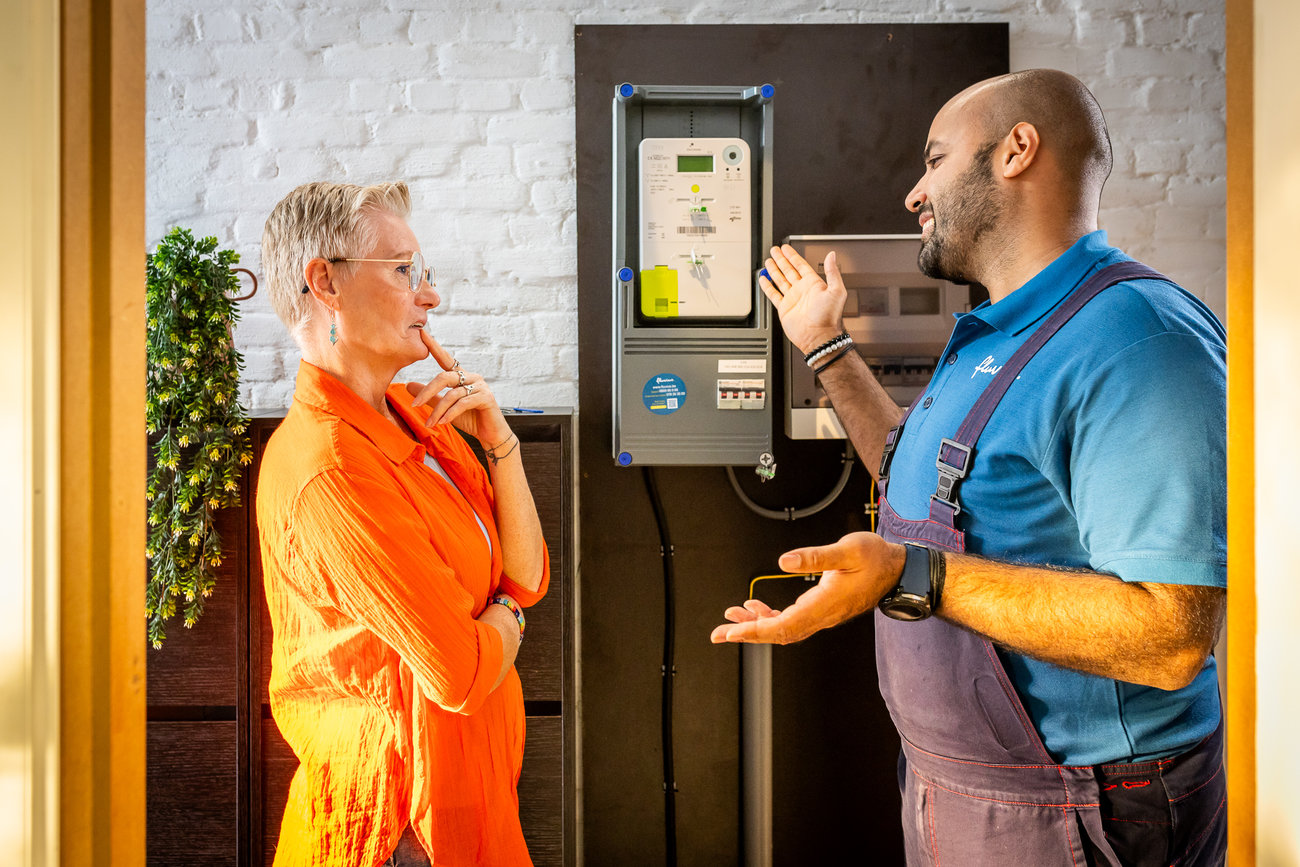
Self-service and digital
We communicate our information and services via an 'omnichannel policy' to a broad target group of customers. Self-service and digitalisation are key here, so that a large proportion of our customers can call on us 24/7. At the same time, we also continue to provide optimal support to non-digital customers. Our approach is the 'Avoid-Click-Call-Face' customer channel strategy. In this regard, a live customer contact is ideally not necessary, for example, because things are clear for the customer, the customer is assisted online or contacts our call centre. In this way, we want to use the available resources as efficiently as possible.
Customer channels
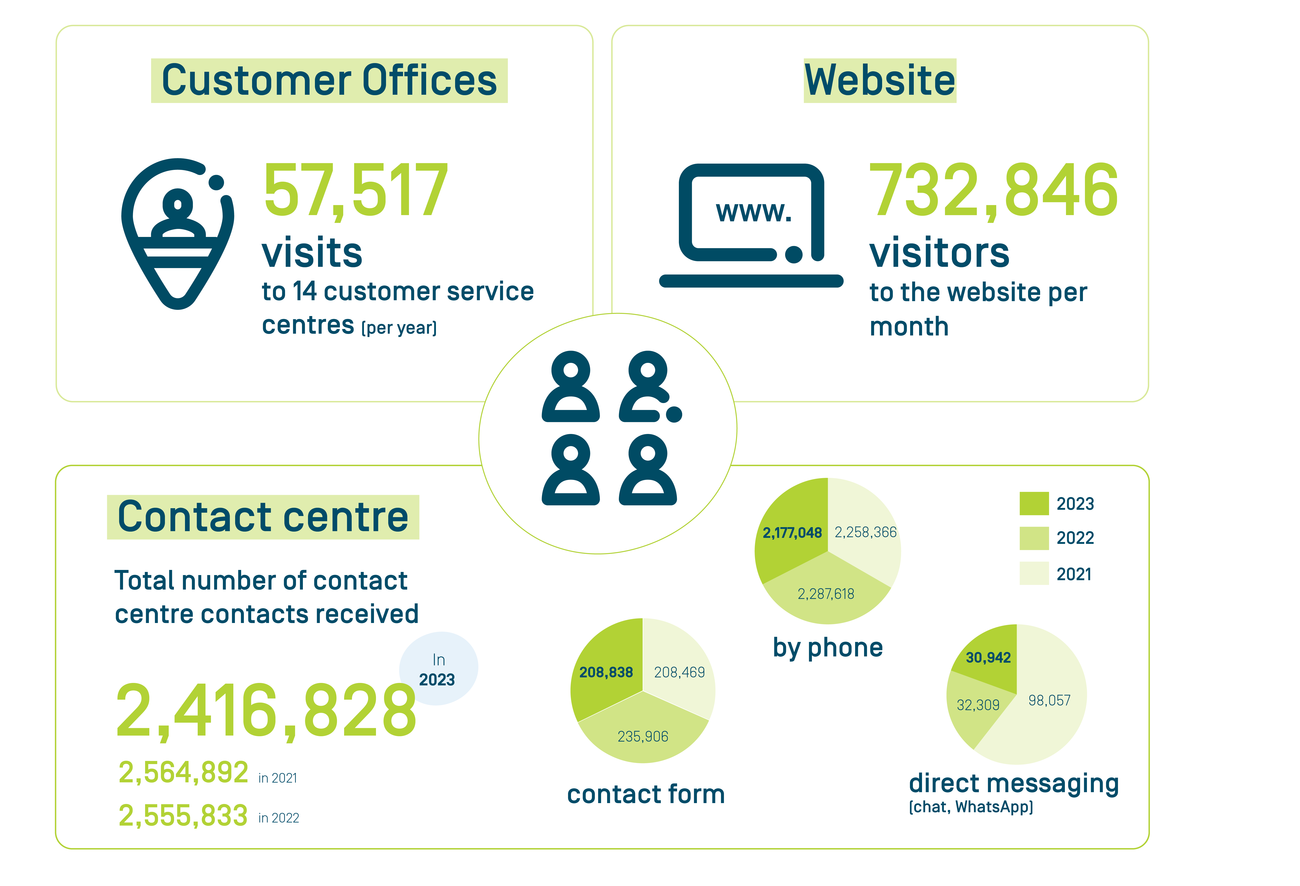
Fluvius' visitor information website:

Mijn Fluvius: what applications do customers open the most?

Looking after networks
Fluvius is a network business. We build public networks for electricity, natural gas, public lighting, sewerage, and heating. We then give customers access to these public networks. And finally, we provide services relating to these utilities day and night. Our focus in this regard is on reliability and affordability.
In 2023, the average Fluvius low-voltage customer was without an electricity supply for just 22 minutes and 25 seconds due to interruptions to the low-voltage and medium-voltage network. Thanks to that, Flanders has been at the top of the European table (for years).
Since 1 January 2023, network tariffs for electricity have been charged via the 'capacity tariff'. Part of the network fee is no longer calculated solely on the kilowatt hours taken off per year, but largely based on the load on the network. This is calculated via the average highest monthly quarterly power, i.e. the 'peaks' you consume. We call this the capacity tariff.
Additional efforts for the energy and climate transition
Fluvius is committed to supporting the energy and climate transition to the maximum extent possible. On 31 March 2023, the Vlaamse Nutsregulator approved our 2023-2032 Investment Plan. For the next edition of the Investment Plan, the Vlaamse Nutsregulator is asking for clarification of the specific impact of digitalisation on network management and the timing for the rollout of the 400V networks.
For the period 2024-2033, Fluvius envisages €4 billion of additional investment in electricity distribution networks, on top of the €7 billion already planned. These additional funds are necessary to make modifications, extensions and reinforcements to 30,000 kilometres of low-voltage network, 6,000 kilometres of medium-voltage network and 22,450 distribution cabins. The plan is necessary to prepare the distribution grid as well as possible for the energy transition and rising electrification.
Smart network management
We are investing in technically advanced methods of monitoring our networks in real time and controlling them as flexibly as possible. That way, we can allow much more green energy on our existing networks, keep our network reliability high, and avoid a number of substantial network investments. This digitalisation is crucial to the energy transition.
Local generation rising: a record for solar panels
The locally installed capacity on our grids is steadily increasing. In 2023, 19 wind turbines were added on land and 1,047 MW of solar panels were installed on Flemish rooftops. This is a rise of 20%, and a record.
Notable Fluvius network projects in 2023
- Fluvius ready for the largest injection of green gas at BioBlue in Ypres.
- Fluvius boosts electricity supply for Heuvelland and Messines.
- Important step towards new heat network for 1,000 families in Wielsbeke.
- Fluvius prepares electricity network in North Kempen for energy transition.
- Fluvius connects the largest solar roof to the network at WDPort of Ghent in Evergem.
- Smart renovation creates 63 sustainable social housing units in Bilzen.
- Autumn storm Ciarán results in 2,400 urgent interventions at Fluvius.
- The installation of digital water meters is gradually getting up to cruising speed.
- 1 street light out of 4 is interactive.
Heating networks: on the rise
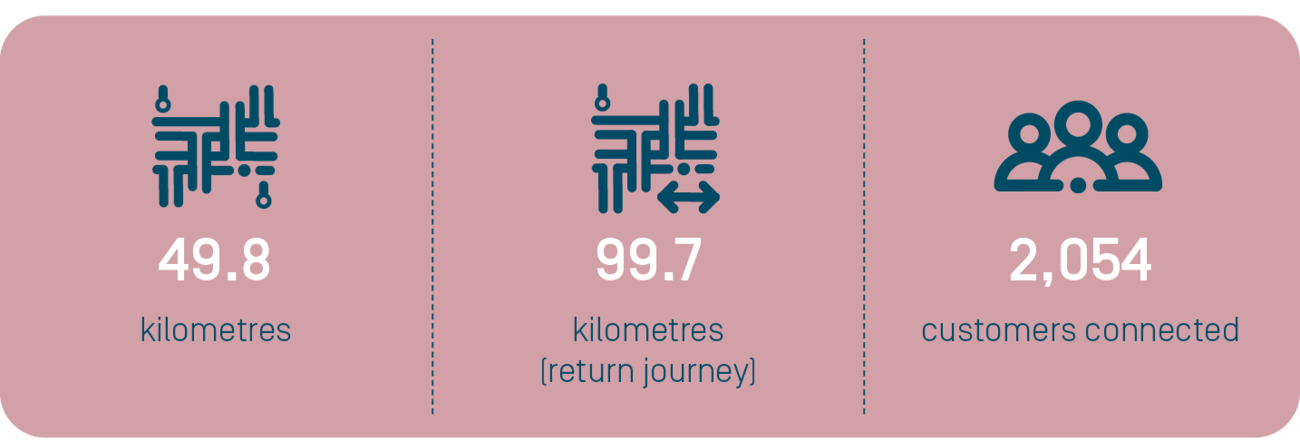
Water management: Flanders’ biggest sewer system operator
We want to play a strategic role in Flemish water management. Joining forces with municipalities enables sewage to be processed even better.
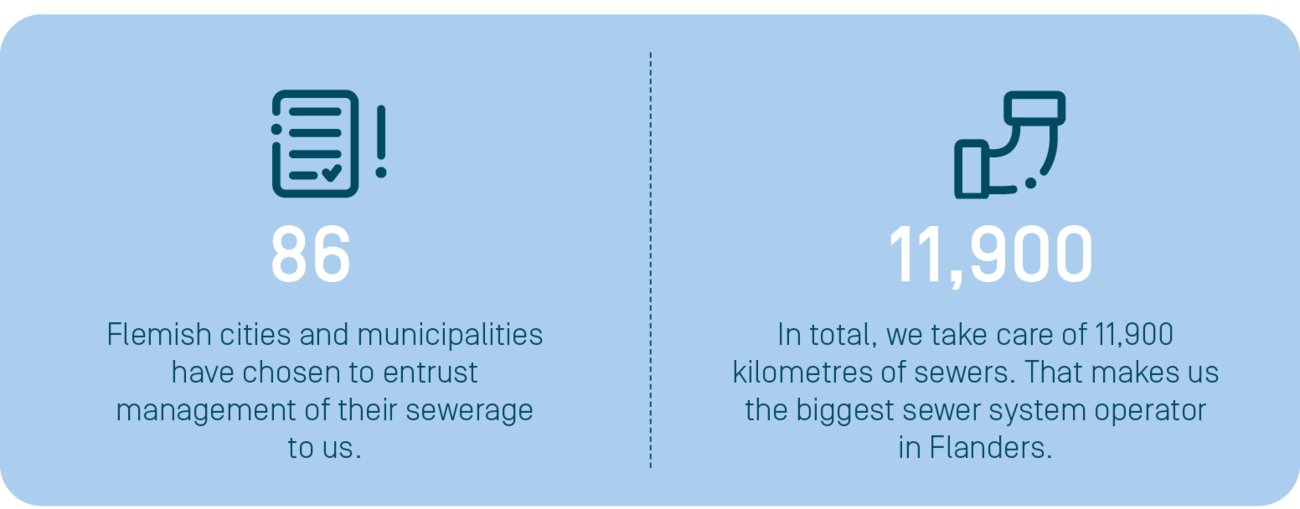
Investment in the sewerage network
We are increasing the current average budget of €80 million for sewerage from 2024 to €130 million, guaranteed up until 2033. This should give us the necessary financial heft to achieve our ambitious goals. We are linking these funds to a clear roadmap that lists the most important steps. In addition, Fluvius has set up a new department in the Network Operations Directorate to realise all necessary investments and operational tasks.
Blue Deal
We suffer from alternating water shortages and flooding in Flanders. It is both too wet and too dry.Our natural environment is highly fragmented, which also puts pressure on ecosystems. The Flemish Government launched the Blue Deal in 2020 to structurally tackle these problems. This is the collective name for various projects and initiatives supported by Fluvius, and which focus among other things on depaving, rewetting, circular water use, cooling and greening, among others.
All lights LED
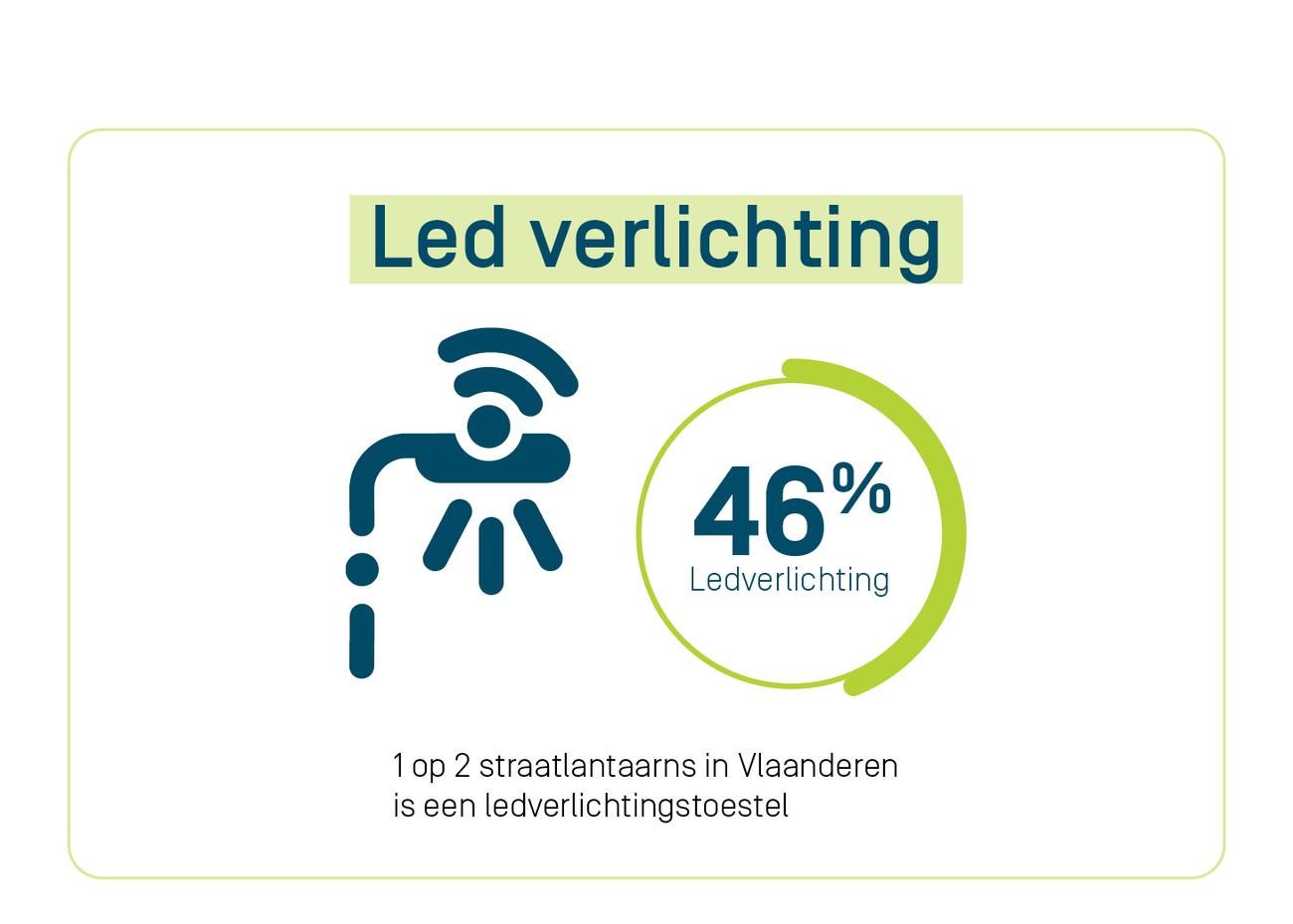
By the end of 2028, we will have systematically replaced all analogue public lighting with LED lights, as stated in the Flemish coalition agreement. In this regard, we have signed a memorandum of intent with the Association of Flemish Cities and Municipalities (VVSG) and the Agoria technology federation.
Databeheer
As an independent data manager, we make a lot of data available to various parties in the energy landscape. In this way, we continue to build an open, active and reliable relationship with all our customers, suppliers and third parties, local governments and other authorities, and our regulators. In the process, we always respect privacy laws and focus on data quality. We offer various datasets on our website as open data, and we are systematically expanding this offering. In 2023, we started working towards the vision for data that we want to achieve by 2025. The four pillars of this vision are:
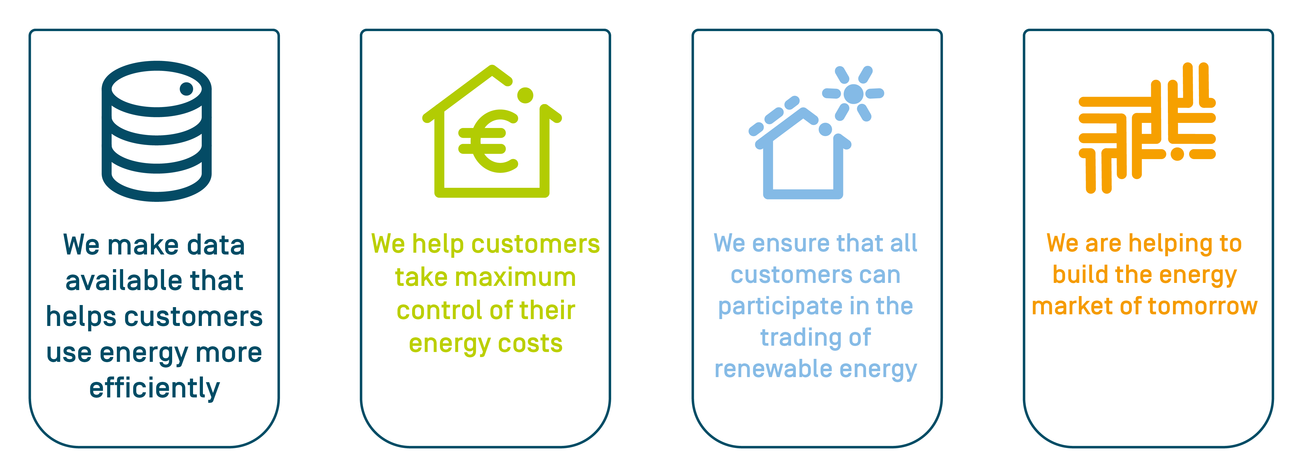
All processes in the market - such as new connections, supplier changes and meter regimes - are described in the MIG (Message Implementation Guide). These are the rules of the game, which all market players and their IT systems follow closely.
The go-live of MIG-6 and CMS have had quite a few after-effects. One of these is the issue of blocked EANs. At the end of 2023, we were still confronted with just under 4,000 EANs that were long-term blocked (compared to 6,000,000 EANs where it runs smoothly). Along with Atrias and the suppliers, we are working towards a solution.
MIG6, combined with new processes, is a major step toward the market functioning of the future of the energy market. But there are also new possibilities for our customers:
- Customers can opt for monthly billing for electricity and gas. As such, there were already 115,766 contracts at the end of 2023. This is a sharp increase from 31,086 in 2022.
- Customers can request a 'meter regime 3' from energy suppliers, whereby quarterly figures are exchanged and dynamic supply contracts are possible. As of 31 December 2023, 41,167 customers benefited from this meter regime, up from 11,555 in 2022.
- Customers can share or sell energy to other connection points (EANs). At the end of 2023, we registered more than 7,700 customers participating in some form of energy sharing. A sharp increase from 600 in 2022.
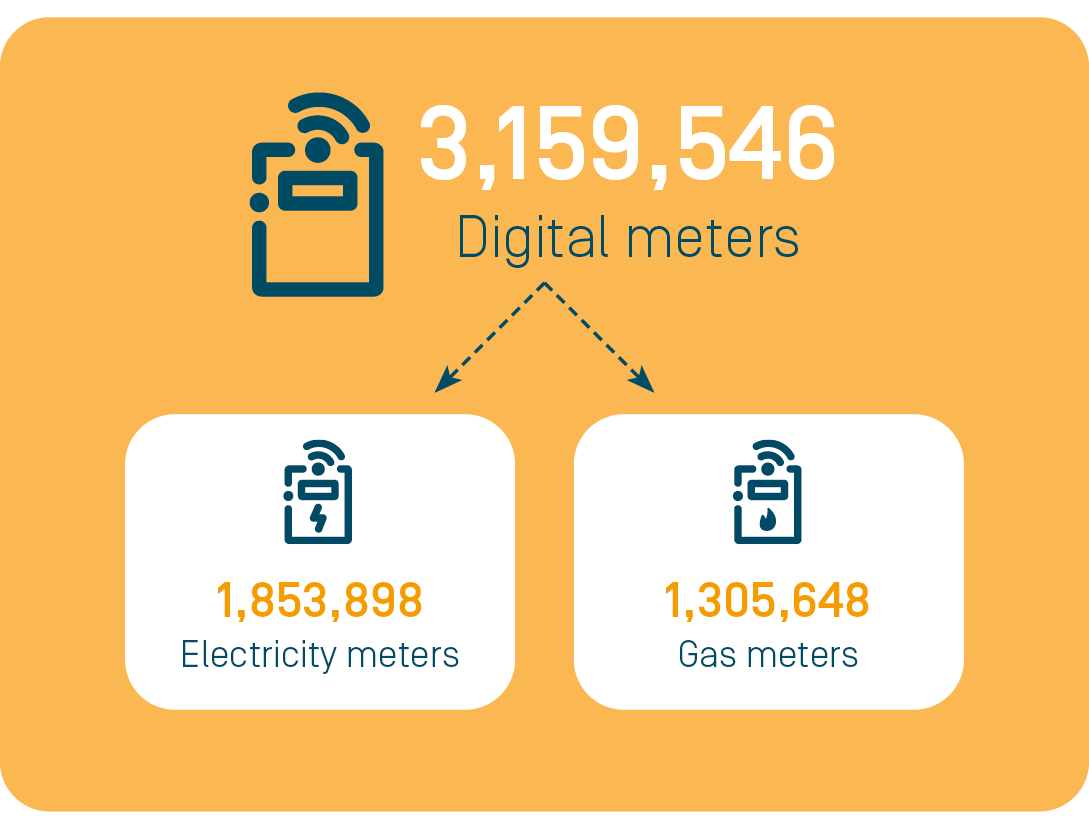
Working collectively for a sustainable world
We work with a large number of different partners to put our expertise to use for society as a whole and help create a sustainable world. We use our knowledge and capabilities as a lever to help use the natural resources of our planet (water, energy, etc.) in a rational way. Our goal is to produce more renewable energy, reduce CO2 emissions in Flanders, and encourage people to use energy and water rationally.
99,000 premiums
In 2021, the Government of Flanders decided to merge the income-related renovation premiums of Wonen Vlaanderen and the energy premiums of Fluvius into one premium: 'My Rebuilding Premium'. Customers have been able to apply for this premiums at the single counter at www.mijnverbouwpremie.be since 1 October 2022.
The My Rebuilding Premium applies to eight categories of works. From renovations of roofs, exterior walls, exterior joinery, floors, foundations and interior areas, to technical installations and renewable energy systems such as heat pumps, heat pump boilers, or solar water heaters. The remaining energy premiums, for example for solar panels, EPC label, electric heat control, do-it-yourself roof insulation, relighting, asbestos removal in combination with PV, or the retroactive investment premium, are still with Fluvius and customers can still apply for them through 'My Fluvius'.
Fluvius received a total of 99,126 premium applications in 2023. This is a small increase of 2,932 applications, or 3% compared to 2022.
New campaign about BENOveren
Since 1 January 2023, there has been a renovation obligation for people who buy, inherit or are donated an energy-inefficient house or apartment with EPC label E or F. Within five years, the new owner must renovate their new home to at least energy performance label D. To inform our customers, we launched a new campaign on social media about BENOveren in the autumn of 2023.
Free online info session 'Save on your energy bills'
Local authorities can organise free 'Energy-fit sessions' on various topics: from energy savings to renovation works. We organise these sessions for residents at the request of the city or the municipality.
Energy-saving plan for public buildings
We are helping cities and municipalities to achieve the 2030 and 2050 climate targets by making their buildings energy-efficient:
- 36% of local authorities solicited our services.
- 13 cities and municipalities received a new energy-saving plan from us in 2023.
- 2,692 unique users have since visited our E-lyse energy management platform.
- 24% of all Flemish cities and municipalities have received our support for energy-saving projects. These figures are lower, or have not risen as much, in 2023 than in 2022 due to the phase-out of ESCO.
Tackling energy poverty
If customers cannot obtain an energy supply contract from their commercial supplier due to payment difficulties, they can come straight to us. As the social supplier, we offer a broad monitoring and support service and try to ensure that these customers become and remain debt-free. The idea is that they will ultimately be able to switch back to a commercial supplier.
But we are going further, and taking action to reduce energy poverty. Thanks to our expertise, and with a large group of partners, we can make a contribution in this area.
Energy scans for disadvantaged households
In 2023, we carried out 26,554 energy scans, enabling vulnerable households to receive specific tips on how to reduce their energy bills. At the same time, we also made several small-scale energy-saving interventions: LED bulbs, water-saving shower heads, draught excluders, etc. If we compare this number to 2022, we see an increase. This is mainly due to the energy crisis.
In 2023, this customer group used 20,435 discount coupons worth €150, €200 or €250 to purchase an energy-efficient refrigerator, freezer, washing machine or dryer. Here, we can see a drop compared to 2022.
Fluvius Prepaid
As a social supplier, in 2023 we helped around 132,000 customers who are struggling financially and can no longer turn to their commercial supplier. We supply them with energy until they have signed a new energy contract with another supplier. We also offer them insight into their consumption, and thus prevent their debts from rising further.
With the introduction of Prepaid in early 2021, we only contacted customers to install a digital meter if they did not pay their energy bills with us either. Since 1 July 2022, we are authorised to activate Prepaid for electricity immediately as soon as the customer contacts us. With this new scheme, we are helping individuals who are already struggling financially avoid taking on more debt.As of the end of 2023, we registered nearly 100,000 active Prepaid meters.
Tackling fraud
Detecting fraud is one of our 'public service obligations', as stipulated by the government. We have been focused on fraud detection for years. It is important work from a social perspective: fraud is effectively stealing money from other customers. It is also crucial for the safety of the electricity network.
The most notable matters from our fraud report for 2022 (publication in 2023):
- We recovered €9,121,102 in minimum support. We estimate that by handling these 157 files, we have avoided future payouts of €14,670,000. We also charged a total fraud cost of €105,620.
- Based on analysis of the EPB database with our installation data, we identified a total of 277 cases in 2021 where solar panel installations had violated EPB regulations. We began handling 30 cases in 2021. A further eight cases were handled in 2022, after VEKA had offered the possibility for regularisation.
- We identified and handled a total of 352 cases in 2022 in the context of PV installations declared late, or not declared at all, claiming €97,344 in overdue prosumer fees. In addition, a further administrative cost of €11,700 was billed.
- During 2022, we simplified the cooperation between the back office and the Energy Inspectorate in the context of checks on premiums. In 2022, 283 cases of meter fraud were concluded, for a total estimated amount of €7.25 million. €1.31 million was actually recovered.